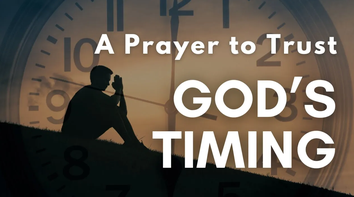Discerning the Pope's 'Blessing' of LGBTQAI+ Couples
When I saw this New York Times headline yesterday, my first thought was that the pope had endorsed homosexual relationships. Judging from the media reaction, many are making the same assumption. When I read the actual Vatican announcement, I learned that the truth is much more complicated. Nonetheless, my first impression is, I fear, the lasting impression this news will leave with our secularized culture.
At the outset, I want you to know that my response does not express an anti-Catholic bias on my part. I have been privileged to know and serve alongside many Catholic priests across my ministry and am grateful for the many Catholic readers of The Daily Article. Catholic writers and theologians continue to inform and enhance my personal spiritual life. And I deeply appreciate the church’s continued support for the sanctity of life.
Nonetheless, I believe the Vatican’s announcement to be a foundational mistake with massive cultural ramifications we need to understand through the lens of biblical truth.
“When people ask for a blessing.”
Titled “Fiducia Supplicans: On the Pastoral Meaning of Blessings,” the declaration was submitted to Pope Francis for his review and approved with his signature. It “remains firm on the traditional doctrine of the Church about marriage, not allowing any type of liturgical rite or blessing similar to a liturgical rite that can create confusion.” In this way, it is not “changing in any way the Church’s perennial teaching on marriage.”
In fact, the document quotes Francis’ definition of marriage as the “exclusive, stable, and indissoluble union between a man and a woman, naturally open to the generation of children.” The declaration adds, “It is only in this context that sexual relations find their natural, proper, and fully human meaning” and states that “the Church’s doctrine on this point remains firm.”
What is new here, however, pertains to the “blessing” of individuals by the church, an act separate from the sacrament of marriage. In short, the declaration extends to Catholic clergy the authority for “blessing couples in irregular situations and same-sex couples.”
The document then spells out in detail the practice of “blessing” in Scripture. It notes that biblical blessings are often conveyed by God to people and by people to others without moral preconditions. It, therefore, advises: “When people ask for a blessing, an exhaustive moral analysis should not be placed as a precondition for conferring it. . . . those seeking a blessing should not be required to have prior moral perfection.”
To summarize: Fiducia Supplicans authorizes Catholic clergy to pray for God’s blessing on those in “irregular” and same-sex relationships, so long as this is not confused with the liturgical sacrament of marriage, which remains available only to a man and a woman.
“If the trumpet makes an uncertain sound.”
Fiducia Supplicans states that “the Church does not have the power to confer its liturgical blessing when that would somehow offer a form of moral legitimacy to a union that presumes to be a marriage or to an extra-marital sexual practice” (my emphasis) and adds that “there is no intention to legitimize anything.” But this is already how the document is being interpreted by LGBTQ advocates and the mainstream media.
This is because to “bless” someone in non-theological Catholic terms means precisely to “legitimize” them. When I asked my then girlfriend’s father for his “blessing” on our engagement, his affirmation was obviously his endorsement of our marriage. As Merriam-Webster makes clear, to “bless” someone means to “approve” of them.
Rev. James Martin, a prominent Catholic LGBTQ advocate, responded to the Vatican’s declaration: “Along with many priests, I will now be delighted to bless my friends in same-sex unions.” Anyone reading his words would assume that they “offer a form of moral legitimacy” to such unions.
This is a significant step toward normalizing LGBTQ relationships, now with the “blessing” of the leader of the largest Christian denomination in the world. Such normalizing is unbiblical since Scripture clearly forbids “sexual immorality, impurity, sensuality” and all sexual activity outside marriage (Galatians 5:19). Rather than give such an “uncertain sound” (1 Corinthians 14:8 NKJV), we are to “flee from sexual immorality” (1 Corinthians 6:18) and encourage everyone else to do the same (cf. James 4:17).
“We must obey God rather than men.”
Fiducia Supplicans offers the Church’s blessing not only to same-sex couples but also to those in “irregular situations.” The document nowhere defines the term, but it does refer to those who are engaged in “extra-marital sexual practice.” I assume that the two phrases are meant to be equivalent.
Would they include those in polygamous and polyamorous relationships, a growing movement in our culture? What about adulterous relationships? Sexual relationships between adults and minors? Between humans and animals?
Once we start blessing what God forbids, where do we stop? This is why the apostles’ testimony should be ours: “We must obey God rather than men” (Acts 5:29). And it is why Scripture warns: “Desire when it has conceived gives birth to sin, and sin when it is fully grown brings forth death” (James 1:15).
“There is no freedom without truth”
It seems that Pope Francis wants the Catholic church to be more loving toward all people regardless of the sins they commit. I commend such inclusive grace. God loved us “while we were still sinners” (Romans 5:8) and calls us to love others in the same way (cf. Matthew 22:39).
But in a culture that understands “blessing” not in the technical terms of the Vatican declaration but in the general dictionary sense of approving, the document will mislead many into believing that God condones what he, in fact, forbids. It will, therefore, encourage people to commit sexual sins—homosexual and heterosexual—that are harmful to them. And it will be used to marginalize and stigmatize further those of us who declare and defend biblical morality.
Pope St. John Paul II observed, “Freedom consists not in doing what we like, but in having the right to do what we ought.” How do we know what we “ought” to do? He added: “Man’s free creative forces will only develop to the full if they are based on the truth. . . . There is no freedom without truth.”
Where do we find such “truth”?
Jesus said to his Father, “Your word is truth” (John 17:17) and promised his followers that the Spirit would “guide you into all the truth” (John 16:13). Accordingly, during this Advent week of joy, we can say to God, “You make known to me the path of life; in your presence there is fullness of joy” (Psalm 16:11).
Will you walk God’s “path of life” into the “fullness of joy” today?
NOTE: You’re reading The Daily Article for free, which is made possible by the thousands of donors who consistently support our ministry. Will you join them during our critical end-of-year giving season? If our content has inspired, equipped, or encouraged you, please donate today.
Photo Courtesy: ©Getty Images/Giulio Origlia/Stringer
Publish Date: December 19, 2023
Jim Denison, PhD, is a cultural theologian and the founder and CEO of Denison Ministries. Denison Ministries includes DenisonForum.org, First15.org, ChristianParenting.org, and FoundationsWithJanet.org. Jim speaks biblically into significant cultural issues at Denison Forum. He is the chief author of The Daily Article and has written more than 30 books, including The Coming Tsunami, the Biblical Insight to Tough Questions series, and The Fifth Great Awakening.
The views expressed in this commentary do not necessarily reflect those of CrosswalkHeadlines.
For more from the Denison Forum, please visit www.denisonforum.org.
The Daily Article Podcast is Here!







